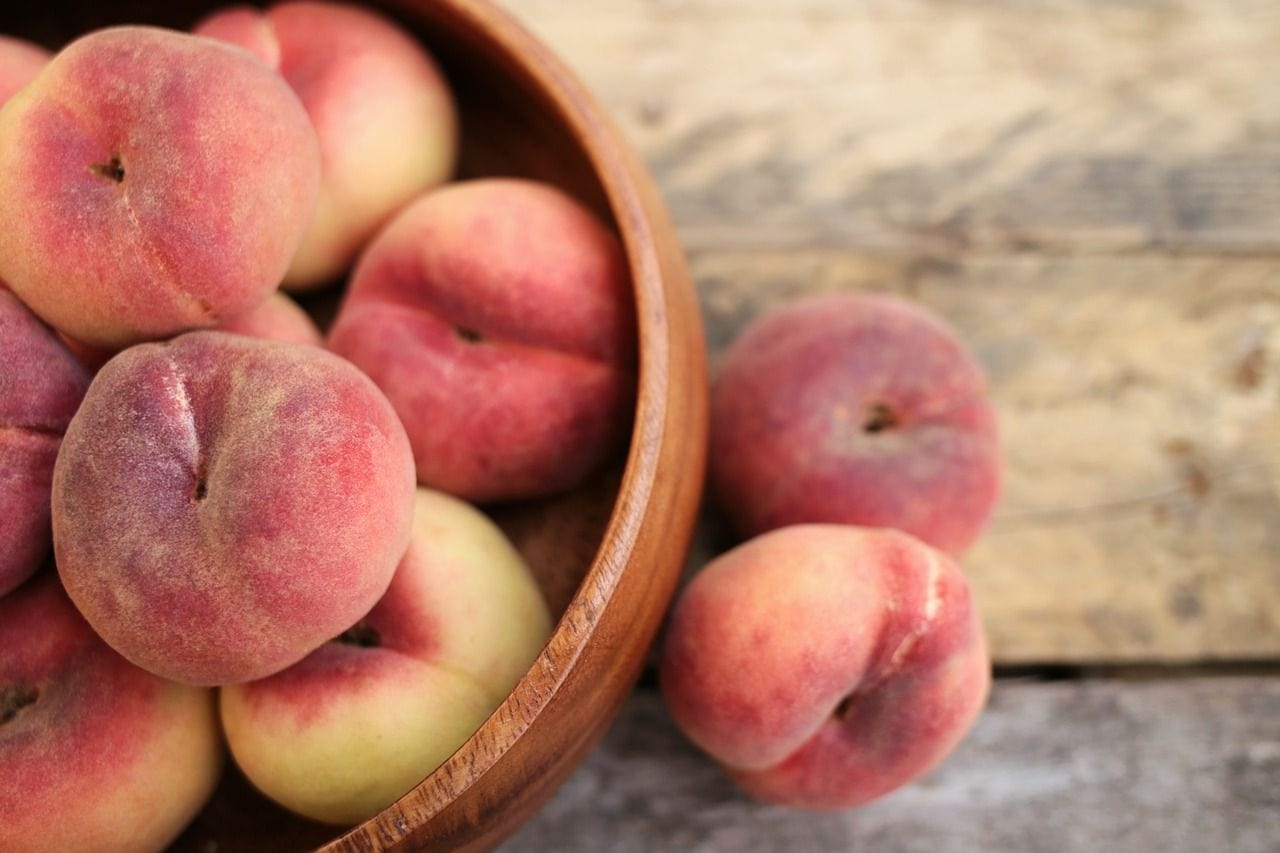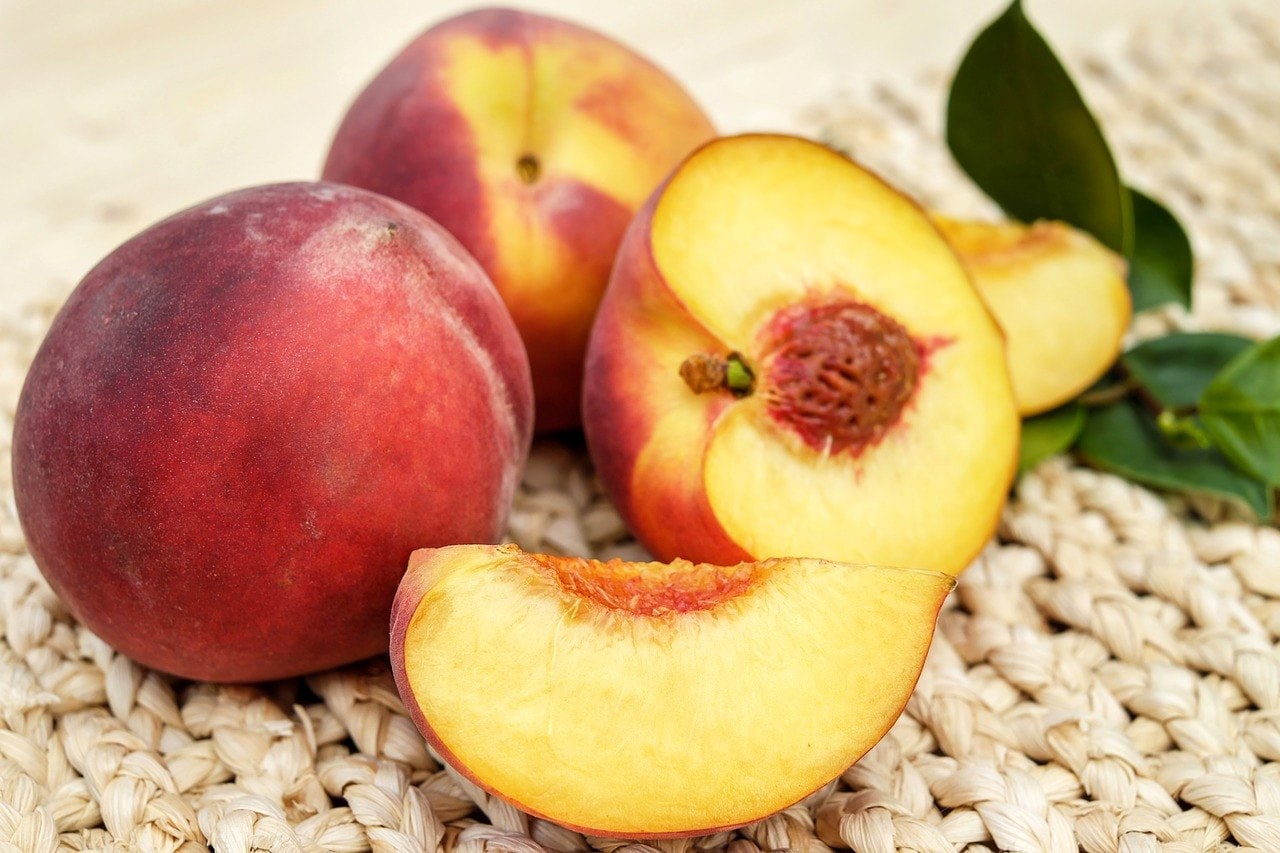
Many dog owners love sharing their food with their furry companions, but it’s essential to be cautious about what we offer them. Common snacks to munch on include fruits such as peaches, and you may wonder, “Can dogs eat peaches?” After all, peaches are a delicious and juicy fruit that many of us humans enjoy. The simple answer is yes! Dogs can eat peaches provided that they are presented in small amounts.
But like all fruits not typical for a dog’s diet, there are certain things to consider to ensure that you are not putting your dog at risk when feeding them peaches.
In this article, we’ll explore whether it’s safe for dogs to consume peaches, their nutritional content, potential benefits, and any risks involved!
Can Dogs Eat Peaches?
The answer to whether dogs can eat peaches is a bit nuanced in the sense that there are many things to consider. While peaches themselves are not toxic to dogs, certain precautions need to be taken. Dogs can safely consume the flesh of ripe peaches, provided they are fed in moderation and prepared correctly.
However, it’s important to avoid feeding them the pit, stem, or leaves of the peach, as these parts can pose hazards to their health. The pit, in particular, contains a compound called amygdalin, which can break down into cyanide when ingested.

Are Peaches Healthy for Dogs?
Peaches offer several health benefits to dogs when fed appropriately. They are a rich source of vitamins A and C, which support immune function and promote healthy skin and coat. Peaches also contain dietary fiber, which aids digestion and can be beneficial for dogs with certain gastrointestinal issues. Additionally, the natural antioxidants found in peaches help protect against cellular damage caused by free radicals.
Peaches are low in calories and fat, making them a healthy treat option for dogs. A medium-sized peach (about 150 grams) contains approximately 60 calories. They also provide a good amount of water content, which helps keep your dog hydrated. Along with vitamins A and C, peaches contain potassium, magnesium, and smaller amounts of other essential minerals.
Potential Benefits of Feeding Peaches to Dogs
Feeding peaches to your dog in moderation can offer some potential benefits. The vitamins and antioxidants present in peaches support overall health, including a strengthened immune system. The fiber content aids in digestion and can help regulate bowel movements.
Additionally, the natural sweetness of peaches makes them a tasty alternative to sugary treats, which can be beneficial for dogs on weight management plans.

Do Dogs Like Peaches?
Each dog has its preferences, but many dogs seem to enjoy the taste of peaches. The natural sweetness and juicy texture can be appealing to them.
It’s important to introduce peaches gradually and observe your dog’s reaction. Some dogs may have an adverse response, such as an upset stomach or diarrhea, if they are not accustomed to eating fruits. Always monitor your dog closely when introducing any new food into their diet, and better yet, consult your veterinarian prior to doing so.
Should Dogs Eat Peaches?
While peaches can be a healthy addition to your dog’s diet if given as a treat, they should not be a primary food source. Dogs require a balanced diet that includes high-quality dog food formulated for their specific nutritional needs.
Peaches should be regarded as an occasional treat rather than a staple food item. Remember to feed them in moderation to prevent any gastrointestinal upset or potential weight gain.
How Much Should You Feed Your Dog?
Despite peaches being a healthy snack, it’s crucial to control the portion size when offering them to your dog. Too much of any new food can cause digestive issues.
As a general guideline, you can start by giving your dog a small slice or a few small pieces of peach. Observe their response and monitor their stool afterward. If they tolerate it well, you can gradually increase the portion size.
Keep in mind that each dog is unique, and it’s best to consult with your veterinarian regarding the appropriate serving size for your specific dog.

How to Feed Your Dog Peaches
Before serving peaches to your dog, make sure to prepare them properly. Wash the peach thoroughly to remove any pesticides or residues that could be harmful to your pet.
An important step in preparing peaches for your dog is to remove the pit, stem, and leaves. These parts can present choking hazards or contain potentially toxic substances.
Finally, you want to chop the peach into small, bite-sized pieces for easier consumption. Remember to serve the peach as a standalone treat or mix it with your dog’s regular food!
Are There Any Risks of Feeding Peaches to Your Dog?
While peaches themselves are generally safe for dogs, there are a few risks associated with feeding them. The pit of the peach can cause intestinal blockage if ingested, and the presence of cyanide can be toxic to dogs.
Not that some dogs may be more sensitive to changes in their diet, and consuming peaches in large quantities or without proper preparation can lead to gastrointestinal upset. Always be mindful of these risks and take appropriate precautions when offering peaches to your furry friend!
What Other Fruits Can Dogs Eat?
If you’re looking to diversify your dog’s fruit options, there are several other fruits that are generally safe for them to consume. Some popular choices include apples (without the seeds), bananas, blueberries, strawberries, watermelon (without the seeds or rind), and pineapple (in moderation).
Like peaches, it’s important to introduce new fruits gradually and in small quantities to assess your dog’s tolerance and any potential adverse reactions. Be sure to prepare them properly before feeding them to your dog as well!

Final Thoughts
In conclusion, dogs can safely eat peaches as long as they are prepared and served properly. Peaches offer various nutritional benefits and can be a healthy addition to your dog’s diet when fed in moderation. Remember to remove the pit, stem, and leaves, as these parts can pose risks to your pet’s health. As with any new food, it’s essential to observe your dog’s response and consult your veterinarian if you have any concerns. By following these guidelines, you can treat your furry companion to the occasional peachy delight while ensuring their well-being!
See also:
Featured Image Credit: Pixabay







